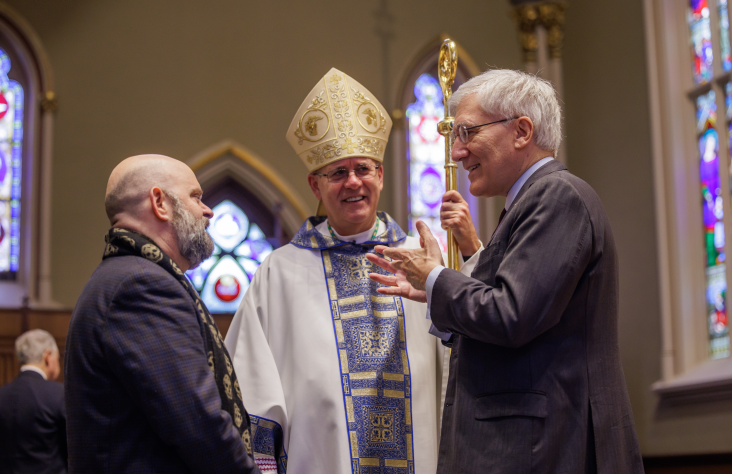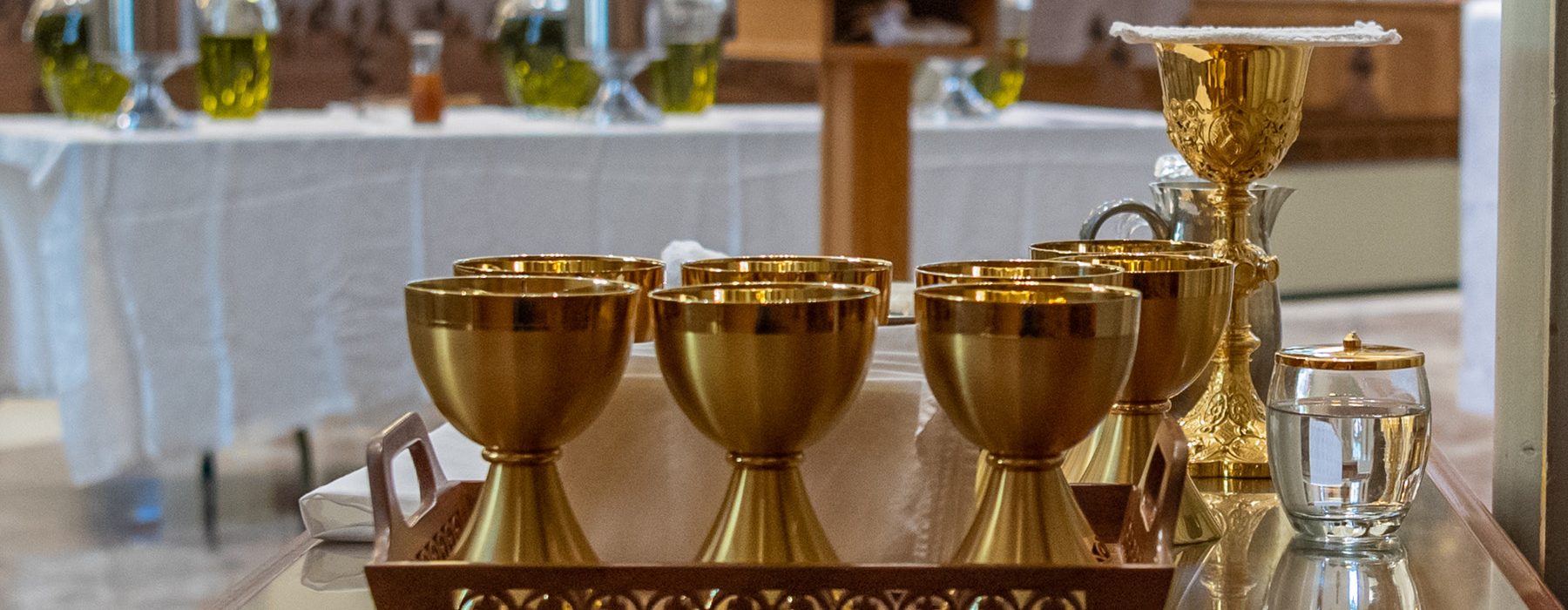April 21, 2020 // National
Epidemic danger and Catholic sacraments
By Thomas Joseph White, O.P.
Editor’s note: The following article first appeared online April 9, 2020, at firstthings.com.
As the Church enters a Triduum where a great majority of the faithful lack public access to the sacraments, I’d like to offer some reflections that stand in sharp contrast to those currently being promoted by the editor of First Things, my friend Rusty Reno, regarding the current pandemic, civic responsibility and access to the sacraments. In fact, I take his views to be rather misguided, though well-intentioned, and am grateful for his magnanimity in inviting me to offer an alternative position. I realize the issues are fraught and anyone’s view is necessarily subject to a fair amount of fallible prudential judgment. I hope, however, to at least ground my arguments in both Catholic principles and a realistic assessment of our current situation, so as to develop what I think are measured and appropriate positions.
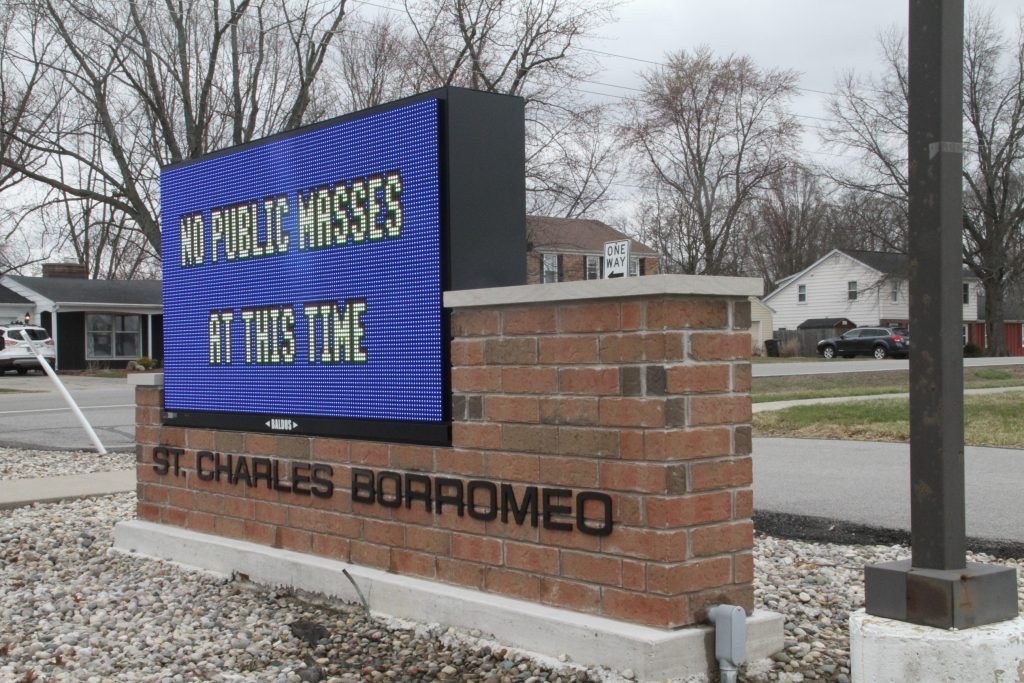
Joshua Schipper
The Catholic Church has generally done whatever is reasonable to prevent the spread of disease and to comply with rational related requests from the government, says Father White.
On the civic response of quarantine measures
My first claim is based on a basic given of natural law. The state has a fundamental obligation to protect human life, especially when it is gravely threatened. This obligation is compounded in a time of epidemic if there is a danger of a generalized collapse of the medical system through a rapid and overwhelming influx of new cases of a deadly disease, which COVID-19 certainly is. In a context where the medical system breaks down, deaths from the disease multiply and many other maladies cannot be safely treated. The state, then, has a moral obligation to seek to halt or slow the spread of the disease. In requesting a thoroughgoing but temporary quarantine, governments across the world are following both traditional, time-tested procedure and proven scientific advice. In doing so they are acting in accord with human inclinations to protect life that are both basic and intrinsically good, even ineradicably so, despite the effects of sin on political organizations. Civic governments are wounded by sin, but not radically depraved. They can still pursue and uphold basic natural goods, as they are seeking to do in this case.
Furthermore, because temporary (two to three months) quarantine measures are the essential key to stemming transmission rates so that societies can learn to deal with this illness more competently, quarantine is also a necessary first step in the restoration of public economic well-being and civic freedoms. Opposing the two (health vs. civic flourishing) is scientifically unrealistic and ethically irresponsible.
The Catholic perspective on the common good and solidarity can and should naturally align with the act of public reason requiring temporary quarantine, not protest it in the name of a misbegotten exaggerated libertarianism. It is true that Christians can and should maintain measured reserve regarding political regimes and the state, especially when they illegitimately ignore the moral obligations of natural law or encroach upon arenas of religious freedom. But Christians should also be on guard against exaggerated individualism, magical thinking that ignores scientific evidence and religiously rationalized narcissism. Protesting quarantine because it disrupts one’s lifestyle choices can be a sign of displaced individualism, denial of reality and bourgeois entitlement. Furthermore, it is obvious at this time that the national community must agree on measures of public health as a precursor to resolving larger political and religious disagreements. Here Christians should exhibit a sense of solidarity in pursuing the common good and foster a sense of greater empathy for those who are especially vulnerable: the elderly, those with pre-existing medical conditions, people with disabilities and the poor who frequently have a lower quality of health, to say nothing of the young and ordinarily healthy people who are also dying from this disease. To cause division on the fundamental good of protecting human life during a pandemic by way of moderate quarantine measures seems to belie these efforts.
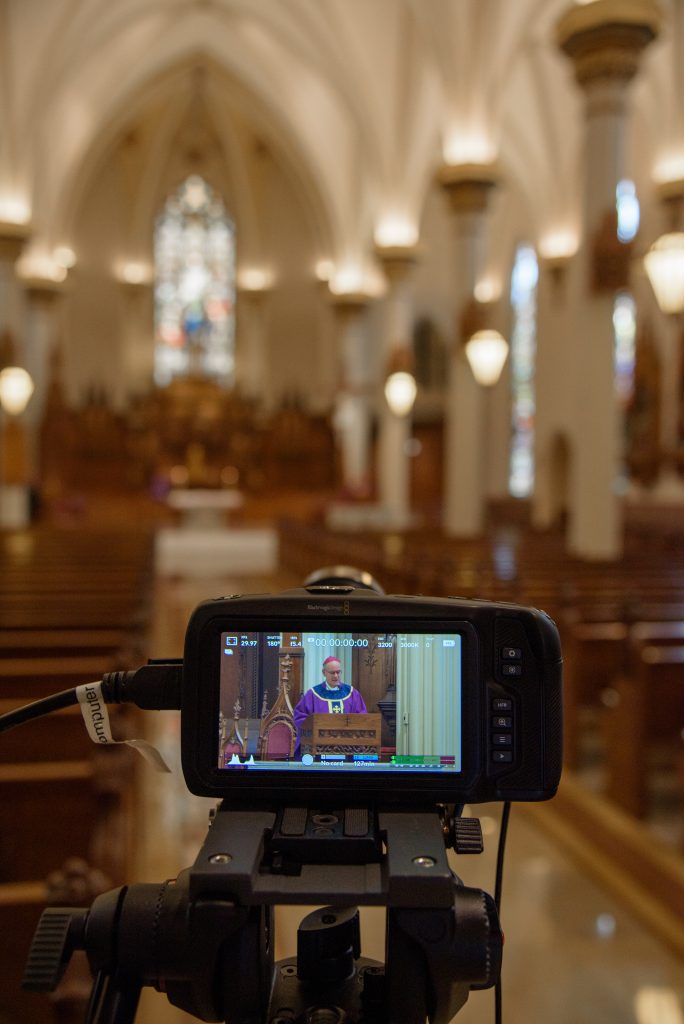
Nate Proulx
Modern technology allows for more opportunities to practice the faith than in past times of crisis, while still erring on the side of safety for both priests and the public.
Sacraments in an era of pandemic
The first thing to be said about the suspension of public Masses is that it is not innovative nor is there any evidence that it stems from undue influence of a secular mentality. In fact, there is clear evidence that in medieval and modern Europe, as well as in the U.S., this form of response on the part of the Church is a very traditional and time-tested one. St. Charles Borromeo has been mentioned much in these discussions. He closed the churches of Milan due to a plague in 1576–77. During this time, he arranged for Masses to be celebrated outside and at street intersections so that people could watch from their windows. There wasn’t any question of distributing Communion since it would have been rather unusual in this period for most people to receive regularly at Mass. This lasted about two years. There are many other medieval and early modern examples that could be cited, but much more recently, in 1918, the churches in many parts of the United States closed for public worship during the Spanish Flu. In New Orleans (hardly a Protestant city) the city ordered that churches had to close, which did prompt some outcry from Catholic pastors who said that this had not been done during earlier epidemics. They were in error. Old moral theology manuals classically indicate that one of the reasons a priest can celebrate Mass privately without a server is due to plague, which shows that earlier moralists understood that priests might not be able to celebrate publicly during such times. The bottom line is that the Catholic Church generally did whatever was reasonable to prevent the spread of disease and to comply with rational city ordinances. It chafed a little and pushed back against things that seemed unreasonable, but when it needed to suspend gatherings for Mass, it did so. By contrast, in 1918 some Christian Scientists in the U.S. refused to close churches based on the premise of their spiritual superiority and argued that if they were pious enough, the gathering would not be affected by the illness, nor would they transmit it to others. Here nature is replaced by an appeal to permanent miracle and common sense and natural reason have given way to vain spiritual presumption. This is what good old-fashioned theology calls a heresy.
Secondly, it is in fact seriously unethical to attribute to the leaders of the Catholic Church the principal intention of selfishly trying to protect themselves from getting sick. (The technical word here is “calumny.”) Bishops and priests do have the right to try to avoid getting sick, as a matter of fact and it is a natural right that cannot be denied to them even if one disagrees with their prudential decisions. More to the point, they also can infect older members of their communities who will be likely to die. (As I write this, two older Dominican priests I know have died from the virus this past week and dozens of others are struggling with the illness. I wonder how many of my confreres will have to die before critics will concede that it is reasonable for younger priests who live in rectories with them to take serious precautions?) But this set of concerns, while legitimate, is in fact secondary. The primary issue the bishops are concerned with is the protection of others. This virus spreads through social contact, purely and simply. Often those who have it are asymptomatic and can transmit it even when they think they are healthy enough to say Mass or attend Mass. If priests have public Masses and then they visit anyone who is older than 50, or if they visit the sick and then say public Masses, they will help spread the illness both indirectly (by gathering people together) and directly (by becoming transmitters). Under these conditions the temporary suspension of public Masses is not only reasonable, but strongly morally defensible.
This is the case even when there are also priests who decide to heroically expose themselves to the illness for the sake of others and their spiritual care. In the Catholic tradition, the practice of heroic virtue on the part of priests and religious is not mandated but should be invited and lauded. Even here, however, one has to be reasonably prudent. It is one thing to make a martyr of one’s self and another thing to eradicate a nursing home in the process. In a case like this, priests may only minister to those who are infected if they themselves are taking sufficient precautions not to infect others, which requires some kind of ongoing quarantine for the duration of the crisis (at least in its most acute phase). This is precisely the practice that has been undertaken in my own Dominican province (and I’ve heard of other such cases in both Italy and the U.S.), where members of the province living under quarantine apart from others are ministering to the sick. The decision is not a trivial one. At least one priest I know has already contracted the illness and recovered, but is back again serving at the hospital. In Italy, meanwhile, the fact that the churches are not having public Masses allows for the priests to visit the sick either at home or in the hospital. In doing so, many of them have contracted the illness and some of them have died as a result. What this approach prevents is priests spreading the illness either to healthy laity or other priests, who in turn may die from it.
In saying this I am presuming that some essential services can and should be made available to the laity, such as keeping churches open for public prayer or Eucharistic adoration with spatial distancing. Churches should be able to provide confessions in safe circumstances, facilitate anointings and carry out private marriage ceremonies and baptisms, all under the guidance of due prudence. I’m also presuming that the measures enacted by the bishops are temporary, as clearly they are intended to be. A worldwide pandemic of this nature is not an ordinary event and thus leads to many uncertainties in the short and long term. That the Church should suspend public Masses temporarily is defensible as the most reasonable course of action given the novel and unpredictable nature of the illness. It is objectively the best course in such circumstances to err on the side of safety in the protection of life. This gives one time to re-evaluate. Once the quarantine reaches some initial degree of success, standards of practice will evolve and there will be questions of how to safely re-engage public sacramental practices while minimizing public risks. This is not bourgeois reasoning. It is prudential public responsibility.
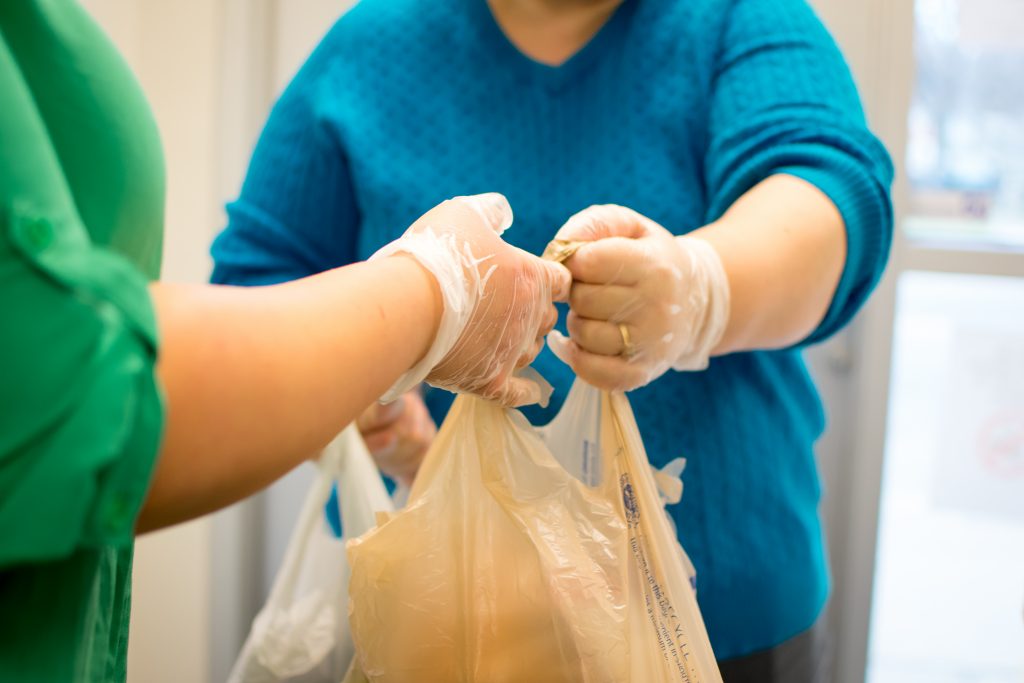
Molly Gettinger
“The life of the heart is as real as the life of the mind and in our current moment, for however long it should last, charity is itself the most basic prophetic activity.” (Father White)
What is our current task? Hope, interiority, Christian empathy
We might ask, what should we be doing as a Church in this time, one that is extremely trying for a great number of people, both religious and non-religious alike? Currently around 1800 to 2000 people are dying in the U.S. daily from this virus, the vast majority of whom would not have died if it had not broken out three months ago. These are not mere statistics. These are people’s parents, brothers and sisters, children, friends and loved ones. The medical staff of our country are currently experiencing the greatest medical crisis in generations and it is costing them a tremendous amount spiritually and physically. In Italy over 100 physicians and 20 nurses have died from the illness in just two months. Something similar is to be expected in the U.S. and is already happening across much of Europe. These people go to work every day knowing that they might die and along with janitors, grocery store clerks and public transport personnel, they are risking their lives for others. Currently priests like myself are being contacted daily by people struggling with the illness or with the death of loved ones. We are living in a time that is deeply troubling for many of our fellow human beings.
In this context the instinctual move of some conservative Christian commentators to practice social criticism while fomenting division among priests, bishops and laity is spiritually corrosive. (What does it do to a priest’s soul, by the way, when we incite him to break the vow he made to God to obey his bishop?) Nor is it helpful to utter the tone-deaf claim that the COVID-19 pandemic is not so bad and that people are overreacting. People are not overreacting when they grieve as their patients, friends, or family members die by the thousands. In fact, the Christian message in this context is one of basic evangelical hope. What we are to learn first in this crisis is that there is life after death, that God loves those who die, that there is the possibility of the forgiveness of sins, that our littleness in the face of death is also an opportunity for surrender, that Christ too died alone from asphyxiation and that he was raised from the dead, that God can comfort the fearful and that there is a promise of eternal life. In the face of death, Christians should be precisely those who put first things first.
Second, Christians ought to treat this pandemic as an opportunity to learn more about God. What does it mean that God has permitted (or willed) temporary conditions in which our elite lifestyle of international travel is grounded, our consumption is cut to a minimum, our days are occupied with basic responsibilities toward our families and immediate communities, our resources and economic hopes are reduced and we are made more dependent upon one another? What does it mean that our nation-states suddenly seem less potent and our armies are infected by an invisible contagion they cannot eradicate and that the most technologically advanced countries face the humility of their limits? Our powerful economies are suddenly enfeebled and our future more uncertain. Priests and bishops are confronted with a new obligation to seek interiority over activism as their sacramental ministry is rendered less potent and laypeople have to find God outside the sacraments in their own interior lives, discovering new ways to be grateful for what they have rather than disdainful in the face of what they lack. We might think none of this tells us anything about ourselves, or about God’s compassion and justice. But if we simply seek to pass through all this in hasty expectation of a return to normal, perhaps we are missing the fundamental point of the exercise.
Finally, what can Christians do to console both their religious and secular neighbors? What about the people heroically risking their own lives to serve others at this time, or those who are ill and afraid, especially those who do not have a religious recourse or perspective? What about those grieving, or those who are isolated? How can we be creative in our hope and empathy? Bishops, priests and laity alike should work together in the coming months to discern how we can safely return progressively to the public celebration of sacraments and have interim steps of public worship in limited ways. But we should also be thinking about how to communicate Christian hope and basic human friendship and compassion to people who suffer, in our words and gestures, both individually and collectively. The life of the heart is as real as the life of the mind and in our current moment, for however long it should last, charity is itself the most basic prophetic activity. “By this they will know that you are my disciples, if you love one another” (John 13:35). I’m citing him because in this and in every other case, His authority comes first.
Thomas Joseph White, O.P., is director of the Thomistic Institute in Rome.
Article reprinted with permission from First Things journal.
The best news. Delivered to your inbox.
Subscribe to our mailing list today.


